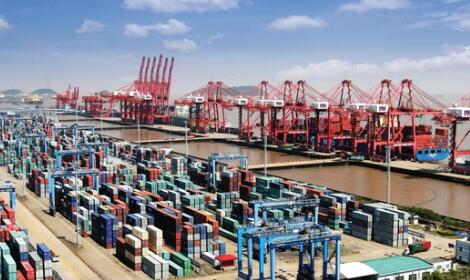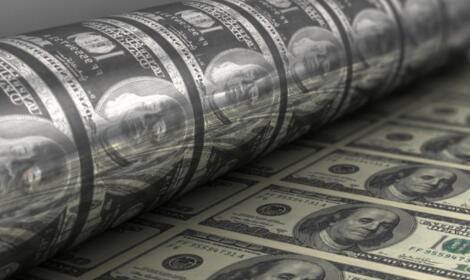短缺经济:世界经济的短缺问题
正文翻译
The shortage economy
短缺经济
The world economy’s shortage problem
世界经济的短缺问题
Scarcity has replaced gluts as the biggest impediment to global growth
短缺已代替过剩成为全球经济增长的最大绊脚石

For a decade after the financial crisis the world economy’s problem was a lack of spending. Worried households paid down their debts, governments imposed austerity and wary firms held back investment, especially in physical capacity, while hiring from a seemingly infinite pool of workers. Now spending has come roaring back, as governments have stimulated the economy and consumers let rip. The surge in demand is so powerful that supply is struggling to keep up. Lorry drivers are getting signing bonuses, an armada of container ships is anchored off California waiting for ports to clear and energy prices are spiralling upwards. As rising inflation spooks investors, the gluts of the 2010s have given way to a shortage economy.
在金融危机结束后的十年里,世界经济面临支出不足的问题。忧心忡忡的家庭偿还部分贷款,政府实施财政紧缩政策,谨慎的企业对投资望而却步,尤其在实体产能方面,而人力资源似乎用之不竭。如今支出已经反弹,因为各国政府都在刺激经济,消费者在尽情消费。卡车司机正在获得签约奖金,一支集装箱船队停泊在美国加州等待港口清关,能源价格不断攀升。随着日益加剧的通货膨胀使投资者感到恐慌,本世纪10年代的过剩经济已经让位于短缺经济。
The immediate cause is covid-19. Some $10.4trn of global stimulus has unleashed a furious but lopsided rebound in which consumers are spending more on goods than normal, stretching global supply chains that have been starved of investment. Demand for electronic goods has boomed during the pandemic but a shortage of the microchips inside them has struck industrial production in some exporting economies, such as Taiwan. The spread of the Delta variant has shut down clothing factories in parts of Asia. In the rich world migration is down, stimulus has filled bank accounts and not enough workers fancy shifting from out-of-favour jobs like selling sandwiches in cities to in-demand ones such as warehousing. From Brooklyn to Brisbane, employers are in a mad scramble for extra hands.
直接原因是新冠疫情。全球投入大约10.4万亿美元刺激资金,释放出剧烈而不平衡的反弹动力,消费者的支出超出正常水平,给缺少投资的全球供应链带来压力。疫情期间的电子产品需求强劲,但“芯片荒”使某些出口型经济体的工业生产遭受打击,例如台湾地区。“德尔塔”毒株的蔓延使亚洲部分地区的制衣厂关闭。在发达国家,移民人数下降,刺激资金填满了银行账户,在城市里卖三明治这类工作已经不吃香,仓库这类工作需求旺盛,但愿意转行的工作者不多。从布鲁克林到布里斯班,老板们都在疯狂地争抢额外人手。
Yet the shortage economy is also the product of two deeper forces. First, decarbonisation. The switch from coal to renewable energy has left Europe, and especially Britain, vulnerable to a natural-gas supply panic that at one point this week had sent spot prices up by over 60%. A rising carbon price in the European unx’s emissions-trading scheme has made it hard to switch to other dirty forms of energy. Swathes of China have faced power cuts as some of its provinces scramble to meet strict environmental targets. High prices for shipping and tech components are now triggering increased capital expenditure to expand capacity. But when the world is trying to wean itself off dirty forms of energy, the incentive to make long-lived investments in the fossil-fuel industry is weak.
但是,短缺经济也是两股深层力量的产物。首先是去碳化,从煤炭向可再生能源的转变使欧洲,尤其是英国容易对天然气供应产生恐慌,本周实时价格的涨幅一度超过60%。欧盟排放交易体系中的碳价上涨,这让欧盟很难改用其他污染型能源。中国有大片地区面临断电,因为某些省份急于达成严格的环境目标。运输和技术部件价格昂贵,促使企业通过增加资本支出来扩大产能。当世界在试图摆脱污染型能源时,长期投资化石燃料产业的动力不足。
The second force is protectionism. As our special report explains, trade policy is no longer written with economic efficiency in mind, but in the pursuit of an array of goals, from imposing labour and environmental standards abroad to punishing geopolitical opponents.
第二股力量是保护主义。正如我们的特别报道所言,贸易政策不再以经济效率为目标,而是追求将劳工和环境标准强加于外国和惩罚地缘政治对手等一系列目标。
This week Joe Biden’s administration confirmed that it would keep Donald Trump’s tariffs on China, which average 19%, promising only that firms could apply for exemptions (good luck battling the federal bureaucracy). Around the world, economic nationalism is contributing to the shortage economy. Britain’s lack of lorry drivers has been exacerbated by Brexit. India has a coal shortage in part because of a misguided attempt to cut imports of fuel. After years of trade tensions, the flow of cross-border investment by companies has fallen by more than half relative to world gdp since 2015.
本周,美国拜登当局确认,维持特朗普对中国商品征收的平均19%关税,只是承诺企业可以申请免税(与联邦官僚机制相抗争,祝你好运)。全世界盛行的经济民族主义正在导致短缺经济,英国卡车司机的短缺因“脱欧”而加剧,印度煤炭短缺的部分原因是盲目削减燃料进口。经过多年的贸易紧张局势后,自2015年以来的企业跨境投资额相对世界GDP下降了一半以上。
All this might seem eerily reminiscent of the 1970s, when many places faced petrol-pump queues, double-digit price rises and sluggish growth. But the comparison gets you only so far. Half a century ago politicians got economic policy badly wrong, fighting inflation with futile measures like price controls and Gerald Ford’s “whip inflation now” campaign, which urged people to grow their own vegetables. Today the Federal Reserve is debating how to forecast inflation, but there is a consensus that central banks have the power and the duty to keep it in check.
这一切可能使人回想起上世纪70年代的可怕情景,当时有许多地方出现加油站排队、物价两位数攀升、经济增长缓慢。但与当今不可相提并论,半个世纪前的政客推行极其错误的经济政策,采取徒劳的抑制通货膨胀措施,诸如价格管制,杰拉尔德·福特的“立即制止通货膨胀”运动,敦促人们自己种植蔬菜。如今美联储在如何预测通货膨胀方面存在争论,但共识是央行有能力有责任抑制通货膨胀。
For now, out-of-control inflation seems unlikely. Energy prices should ease after the winter. In the next year the spread of vaccines and new treatments for covid-19 should reduce disruptions. Consumers may spend more on services. Fiscal stimulus will wind down in 2022: Mr Biden is struggling to get his jumbo spending bills through Congress and Britain plans to raise taxes. The risk of a housing bust in China means that demand could even fall, restoring the sluggish conditions of the 2010s. And an investment boost in some industries will eventually translate into more capacity and higher productivity.
当前的通货膨胀不太可能失控。能源价格在冬季结束后应该会回落,明年新冠疫苗和新疗法的普及能减少混乱,消费者可能在服务上花费更多。财政刺激将在2022年逐渐停止:拜登先生正努力让他的巨额支出法案在国会获得通过,英国计划增税。中国楼市崩盘的风险意味着需求可能下降,重回本世纪10年代的不景气状况。某些行业的投资增长终将转化为更多的产能和更高的生产率。
But make no mistake, the deeper forces behind the shortage economy are not going away and politicians could easily end up with dangerously wrong-headed policies. One day, technologies such as hydrogen should help make green power more reliable. But that will not plug shortages right now. As fuel and electricity costs rise, there could be a backlash. If governments do not ensure that there are adequate green alternatives to fossil fuels, they may have to meet shortages by relaxing emissions targets and lurching back to dirtier sources of energy. Governments will therefore have to plan carefully to cope with the higher energy costs and slower growth that will result from eliminating emissions. Pretending that decarbonisation will result in a miraculous economic boom is bound to lead to disappointment.
但是别误会,短缺经济背后的深层力量不会消失,政客可能容易推行危险的错误政策。总有一天,氢等技术能使绿色能源更加可靠,但无法解决目前的短缺问题。燃料和电力成本上涨可能引起反弹,如果政府无法确保有足够的绿色能源替代化石燃料,可能只能通过放宽排放目标和重新使用污染型能源来解决短缺问题。因此,政府必须谨慎计划如何应对能源成本上涨和杜绝排放所导致的经济增长放缓,自以为去碳化将带来奇迹般的经济繁荣是注定要失望的。
The shortage economy could also reinforce the appeal of protectionism and state intervention. Many voters blame empty shelves and energy crises on the government. Politicians can escape responsibility by excoriating fickle foreigners and fragile supply chains, and by talking up the false promise of boosting self-reliance. Britain has already bailed out a fertiliser plant to maintain the supply of carbon dioxide, an input for the food industry. The government is trying to claim that labour shortages are good, because they will raise economy-wide wages and productivity. In reality, putting up barriers to migration and trade will, on average, cause both to fall.
短缺经济也会增强保护主义和国家干预的吸引力。许多选民把货架空空和能源危机归咎于政府,政客可以指责反复无常的外国人和脆弱的供应链,宣扬自力更生这种虚假承诺,以此来逃避责任。英国已经帮助一家化肥厂摆脱困境,以确保食品产业所需的二氧化碳供应。政府试图宣扬劳动力短缺是好事,因为这能提高整体经济的工资水平和生产效率。事实上,设立移民和贸易壁垒通常使两者下降。
The wrong lessons at the wrong time
错误的时间得出错误的教训
Disruptions often lead people to question economic orthodoxies. The trauma of the 1970s led to a welcome rejection of big government and crude Keynesianism. The risk now is that strains in the economy lead to a repudiation of decarbonisation and globalisation, with devastating long-term consequences. That is the real threat posed by the shortage economy.
混乱往往使人质疑正统经济学。上世纪70年代的创伤导致大政府和粗糙的凯恩斯主义被欣然抛弃。现在的风险是经济压力导致去碳化和全球化被抛弃,造成长远的毁灭性后果,这才是短缺经济构成的真正威胁。
短缺经济
The world economy’s shortage problem
世界经济的短缺问题
Scarcity has replaced gluts as the biggest impediment to global growth
短缺已代替过剩成为全球经济增长的最大绊脚石

For a decade after the financial crisis the world economy’s problem was a lack of spending. Worried households paid down their debts, governments imposed austerity and wary firms held back investment, especially in physical capacity, while hiring from a seemingly infinite pool of workers. Now spending has come roaring back, as governments have stimulated the economy and consumers let rip. The surge in demand is so powerful that supply is struggling to keep up. Lorry drivers are getting signing bonuses, an armada of container ships is anchored off California waiting for ports to clear and energy prices are spiralling upwards. As rising inflation spooks investors, the gluts of the 2010s have given way to a shortage economy.
在金融危机结束后的十年里,世界经济面临支出不足的问题。忧心忡忡的家庭偿还部分贷款,政府实施财政紧缩政策,谨慎的企业对投资望而却步,尤其在实体产能方面,而人力资源似乎用之不竭。如今支出已经反弹,因为各国政府都在刺激经济,消费者在尽情消费。卡车司机正在获得签约奖金,一支集装箱船队停泊在美国加州等待港口清关,能源价格不断攀升。随着日益加剧的通货膨胀使投资者感到恐慌,本世纪10年代的过剩经济已经让位于短缺经济。
The immediate cause is covid-19. Some $10.4trn of global stimulus has unleashed a furious but lopsided rebound in which consumers are spending more on goods than normal, stretching global supply chains that have been starved of investment. Demand for electronic goods has boomed during the pandemic but a shortage of the microchips inside them has struck industrial production in some exporting economies, such as Taiwan. The spread of the Delta variant has shut down clothing factories in parts of Asia. In the rich world migration is down, stimulus has filled bank accounts and not enough workers fancy shifting from out-of-favour jobs like selling sandwiches in cities to in-demand ones such as warehousing. From Brooklyn to Brisbane, employers are in a mad scramble for extra hands.
直接原因是新冠疫情。全球投入大约10.4万亿美元刺激资金,释放出剧烈而不平衡的反弹动力,消费者的支出超出正常水平,给缺少投资的全球供应链带来压力。疫情期间的电子产品需求强劲,但“芯片荒”使某些出口型经济体的工业生产遭受打击,例如台湾地区。“德尔塔”毒株的蔓延使亚洲部分地区的制衣厂关闭。在发达国家,移民人数下降,刺激资金填满了银行账户,在城市里卖三明治这类工作已经不吃香,仓库这类工作需求旺盛,但愿意转行的工作者不多。从布鲁克林到布里斯班,老板们都在疯狂地争抢额外人手。
Yet the shortage economy is also the product of two deeper forces. First, decarbonisation. The switch from coal to renewable energy has left Europe, and especially Britain, vulnerable to a natural-gas supply panic that at one point this week had sent spot prices up by over 60%. A rising carbon price in the European unx’s emissions-trading scheme has made it hard to switch to other dirty forms of energy. Swathes of China have faced power cuts as some of its provinces scramble to meet strict environmental targets. High prices for shipping and tech components are now triggering increased capital expenditure to expand capacity. But when the world is trying to wean itself off dirty forms of energy, the incentive to make long-lived investments in the fossil-fuel industry is weak.
但是,短缺经济也是两股深层力量的产物。首先是去碳化,从煤炭向可再生能源的转变使欧洲,尤其是英国容易对天然气供应产生恐慌,本周实时价格的涨幅一度超过60%。欧盟排放交易体系中的碳价上涨,这让欧盟很难改用其他污染型能源。中国有大片地区面临断电,因为某些省份急于达成严格的环境目标。运输和技术部件价格昂贵,促使企业通过增加资本支出来扩大产能。当世界在试图摆脱污染型能源时,长期投资化石燃料产业的动力不足。
The second force is protectionism. As our special report explains, trade policy is no longer written with economic efficiency in mind, but in the pursuit of an array of goals, from imposing labour and environmental standards abroad to punishing geopolitical opponents.
第二股力量是保护主义。正如我们的特别报道所言,贸易政策不再以经济效率为目标,而是追求将劳工和环境标准强加于外国和惩罚地缘政治对手等一系列目标。
This week Joe Biden’s administration confirmed that it would keep Donald Trump’s tariffs on China, which average 19%, promising only that firms could apply for exemptions (good luck battling the federal bureaucracy). Around the world, economic nationalism is contributing to the shortage economy. Britain’s lack of lorry drivers has been exacerbated by Brexit. India has a coal shortage in part because of a misguided attempt to cut imports of fuel. After years of trade tensions, the flow of cross-border investment by companies has fallen by more than half relative to world gdp since 2015.
本周,美国拜登当局确认,维持特朗普对中国商品征收的平均19%关税,只是承诺企业可以申请免税(与联邦官僚机制相抗争,祝你好运)。全世界盛行的经济民族主义正在导致短缺经济,英国卡车司机的短缺因“脱欧”而加剧,印度煤炭短缺的部分原因是盲目削减燃料进口。经过多年的贸易紧张局势后,自2015年以来的企业跨境投资额相对世界GDP下降了一半以上。
All this might seem eerily reminiscent of the 1970s, when many places faced petrol-pump queues, double-digit price rises and sluggish growth. But the comparison gets you only so far. Half a century ago politicians got economic policy badly wrong, fighting inflation with futile measures like price controls and Gerald Ford’s “whip inflation now” campaign, which urged people to grow their own vegetables. Today the Federal Reserve is debating how to forecast inflation, but there is a consensus that central banks have the power and the duty to keep it in check.
这一切可能使人回想起上世纪70年代的可怕情景,当时有许多地方出现加油站排队、物价两位数攀升、经济增长缓慢。但与当今不可相提并论,半个世纪前的政客推行极其错误的经济政策,采取徒劳的抑制通货膨胀措施,诸如价格管制,杰拉尔德·福特的“立即制止通货膨胀”运动,敦促人们自己种植蔬菜。如今美联储在如何预测通货膨胀方面存在争论,但共识是央行有能力有责任抑制通货膨胀。
For now, out-of-control inflation seems unlikely. Energy prices should ease after the winter. In the next year the spread of vaccines and new treatments for covid-19 should reduce disruptions. Consumers may spend more on services. Fiscal stimulus will wind down in 2022: Mr Biden is struggling to get his jumbo spending bills through Congress and Britain plans to raise taxes. The risk of a housing bust in China means that demand could even fall, restoring the sluggish conditions of the 2010s. And an investment boost in some industries will eventually translate into more capacity and higher productivity.
当前的通货膨胀不太可能失控。能源价格在冬季结束后应该会回落,明年新冠疫苗和新疗法的普及能减少混乱,消费者可能在服务上花费更多。财政刺激将在2022年逐渐停止:拜登先生正努力让他的巨额支出法案在国会获得通过,英国计划增税。中国楼市崩盘的风险意味着需求可能下降,重回本世纪10年代的不景气状况。某些行业的投资增长终将转化为更多的产能和更高的生产率。
But make no mistake, the deeper forces behind the shortage economy are not going away and politicians could easily end up with dangerously wrong-headed policies. One day, technologies such as hydrogen should help make green power more reliable. But that will not plug shortages right now. As fuel and electricity costs rise, there could be a backlash. If governments do not ensure that there are adequate green alternatives to fossil fuels, they may have to meet shortages by relaxing emissions targets and lurching back to dirtier sources of energy. Governments will therefore have to plan carefully to cope with the higher energy costs and slower growth that will result from eliminating emissions. Pretending that decarbonisation will result in a miraculous economic boom is bound to lead to disappointment.
但是别误会,短缺经济背后的深层力量不会消失,政客可能容易推行危险的错误政策。总有一天,氢等技术能使绿色能源更加可靠,但无法解决目前的短缺问题。燃料和电力成本上涨可能引起反弹,如果政府无法确保有足够的绿色能源替代化石燃料,可能只能通过放宽排放目标和重新使用污染型能源来解决短缺问题。因此,政府必须谨慎计划如何应对能源成本上涨和杜绝排放所导致的经济增长放缓,自以为去碳化将带来奇迹般的经济繁荣是注定要失望的。
The shortage economy could also reinforce the appeal of protectionism and state intervention. Many voters blame empty shelves and energy crises on the government. Politicians can escape responsibility by excoriating fickle foreigners and fragile supply chains, and by talking up the false promise of boosting self-reliance. Britain has already bailed out a fertiliser plant to maintain the supply of carbon dioxide, an input for the food industry. The government is trying to claim that labour shortages are good, because they will raise economy-wide wages and productivity. In reality, putting up barriers to migration and trade will, on average, cause both to fall.
短缺经济也会增强保护主义和国家干预的吸引力。许多选民把货架空空和能源危机归咎于政府,政客可以指责反复无常的外国人和脆弱的供应链,宣扬自力更生这种虚假承诺,以此来逃避责任。英国已经帮助一家化肥厂摆脱困境,以确保食品产业所需的二氧化碳供应。政府试图宣扬劳动力短缺是好事,因为这能提高整体经济的工资水平和生产效率。事实上,设立移民和贸易壁垒通常使两者下降。
The wrong lessons at the wrong time
错误的时间得出错误的教训
Disruptions often lead people to question economic orthodoxies. The trauma of the 1970s led to a welcome rejection of big government and crude Keynesianism. The risk now is that strains in the economy lead to a repudiation of decarbonisation and globalisation, with devastating long-term consequences. That is the real threat posed by the shortage economy.
混乱往往使人质疑正统经济学。上世纪70年代的创伤导致大政府和粗糙的凯恩斯主义被欣然抛弃。现在的风险是经济压力导致去碳化和全球化被抛弃,造成长远的毁灭性后果,这才是短缺经济构成的真正威胁。
评论翻译
本文暂无评论。









